Project News
LAX Celebrate Construction Completion Of Automated People Mover Train Guideway Structure

Construction of 2.25-mile elevated concrete structure began in 2019 (Photo Credit: LAWA)
Flatiron is proud to be part of the team creating the Automated People Mover at Los Angeles International Airport. Another important step in this innovative project has been achieved. This news release was issued by the project owner, Los Angeles World Airports (LAWA).
(Los Angeles, CA) Today, the centerpiece of Los Angeles International Airport’s (LAX) multi-billion-dollar modernization program achieved a major milestone as the last concrete was poured for the Automated People Mover’s (APM) 2.25-mile elevated guideway structure.
“The Automated People Mover will be so much more than another way to get to LAX – it’s the piece of the puzzle that will end the congestion that has been plaguing our airport for decades,” said Mayor Eric Garcetti. “This project is a historic investment in our city’s transportation future, and today’s milestone brings us another step closer to our ultimate goal: bringing modern, reliable public transportation to our airport.”
“Los Angeles no longer has to imagine a transformed LAX, rather we can see the future through our own eyes with the completion of the 2.25 miles of Automated People Mover guideway that will one day soon carry train cars filled with travelers and employees,” said Justin Erbacci, Chief Executive Officer, Los Angeles World Airports. “Over the last two-and-a-half years, we have seen the guideway rise up from its foundation to become a fully completed track, providing us a glimpse at what will provide time-guaranteed access to the airport, ensuring greater mobility for all of those coming to and from LAX.”
Guideway construction began in November 2019 with the first underground support columns being placed, followed by the first column pours in January 2020 and the first guideway segment pour in September 2020. A total of 69,700 cubic yards of concrete were poured since 2019 to complete the structure, along with more than one million work hours.
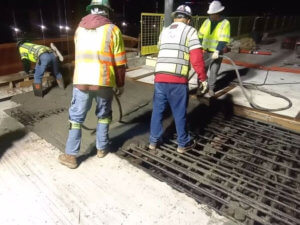
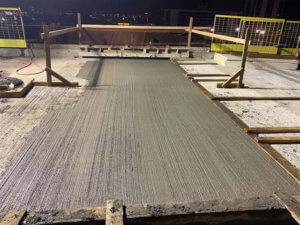
Workers pour the last of 69,700 cubic yards of concrete to complete the guideway structure. (Photo Credit: LAWA)
The last major pour for the guideway structure took place over Sepulveda Boulevard and completed on April 1 after two-and-a-half months of construction. It was the last of three cast-in-place segmentally constructed bridges on the project, the first of which was completed over Century Boulevard last December. The other span, built over Parking Structure 2B in the Central Terminal Area, was fully connected on March 19. Each of these three sections were constructed one short segment at a time with a traveling form system.
The concrete segments were cast in formwork and supported by larger traveling platforms. After the segments were formed and cured, the traveling platforms would move further ahead to help form the next segment. This process repeated on both ends of each span until the traveling platforms met in the middle. The superstructure over Sepulveda Boulevard was built in 12 segments, each approximately 15 feet in length, culminating with a 7.5-foot closure pour.
Click here to view an educational video on cast-in-place segmental construction. Click the image below to see time-lapse footage of the section over Sepulveda Boulevard being constructed.
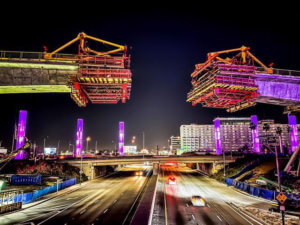
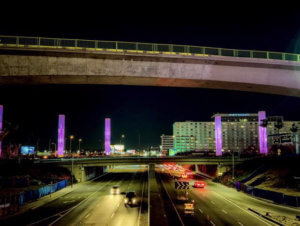
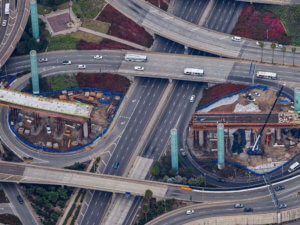
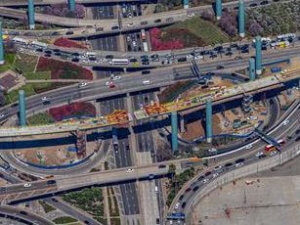
Construction of the segment over Sepulveda Boulevard (top left and right), along with aerial views of the segment from the end of December 2021 (bottom left) and the end of March 2022 (bottom right). (Photo Credit: LAWA)
“The completion of the guideway is a remarkable milestone for the project as we are one step closer to realizing a new transportation experience at one of the world’s busiest airports,” said Sam Choy, Project Director at LINXS Constructors. “We’ll soon build off of this accomplishment with train car testing later this year.”
With the guideway structure now complete, work will continue on building the plinths, which is what the train cars ride on, as well as construction of the emergency walkway on the guideway. The train stations, which are already under construction, will continue to progress with the last steel being placed for the Center and West CTA stations in the coming months. The train Maintenance and Storage Facility will be electrified this summer in preparation for the arrival of train cars.
The centerpiece of LAX’s Landside Access Modernization Program (LAMP), the APM is a 2.25-mile electric train system that will transport travelers in and out of the CTA, connecting them to new off-site parking facilities, regional light rail transportation and the Consolidated Rent-A-Car facility. The APM project is a critical investment into the infrastructure of Los Angeles as the city prepares to welcome the world to the 2028 Olympic and Paralympic Games.
The APM will feature six stations: three stations inside the CTA, which connect to the terminals via elevated pedestrian walkways, and three stations outside the CTA, which will connect to new off-site parking facilities, regional light rail transportation and a Consolidated Rent-A-Car Facility. The APM is expected to relieve congestion within the CTA and in turn the surrounding thoroughfares, thereby reducing emissions and vehicle miles traveled.
To learn more about LAX’s modernization, visit FlyLAX.com/TransformingLAX.

The guideway segment over Parking Structure 2B was completed March 19. (Photo Credit: LAWA)
About Los Angeles International Airport (LAX)
LAX, the fifth-busiest airport in the world in 2021 with 48 million passengers, is in the midst of a $15-billion capital improvement program that will touch on all nine passenger terminals and build new facilities, including an Automated People Mover (APM) train, Consolidated Rent-A-Car (ConRAC) facility and the West Gates at Tom Bradley International Terminal.
In 2019, LAX served nearly 88.1 million passengers and offered an average of 700 daily nonstop flights to 113 destinations in the U.S. and 1,200 weekly nonstop flights to 91 markets in 46 countries on 72 commercial airlines.
LAX generates 620,600 jobs in Southern California, with labor income of $37.3 billion and economic output (business revenues) of more than $126.6 billion, according to an economic study based on 2014 operations. This activity added $6.2 billion to local and state revenues and $8.7 billion in federal tax revenues. The study also reported that LAX’s ongoing capital improvement program creates an additional 121,640 annual jobs with labor income of $7.6 billion and economic output of $20.3 billion; $966 million in state and local taxes; and $1.6 billion in federal tax revenues.
LAX is part of a system of two Southern California airports – along with Van Nuys general aviation – that are owned and operated by Los Angeles World Airports (LAWA), a proprietary department of the City of Los Angeles that receives no funding from the City’s general fund.
LAWA is leading the aviation industry in sustainability practices, with initiatives related to water management, energy (electricity) management, air quality, recycling and natural resources management. In 2019, LAX received Level III ACI Airport Carbon Accreditation from Airports Council International-Europe.
LAWA is also a leader in inclusivity, operating eight programs that provide opportunities for business enterprises including local, small, minority-owned, veteran-owned and disadvantaged firms, and working together with community partners to offer the HireLAX Apprenticeship Readiness Program, which targets local workers to make them ready for rewarding careers in the construction trades, and the Build LAX Academy, designed to prepare small contracting businesses for success when working on projects at LAX.
LAX was named a top-10 U.S. airport by SKYTRAX in 2018, and was honored as the “Most Innovative Airport for Passenger Experience” in 2019 by the American Association of Airport Executives. LAX is the second-most popular airport in the world to appear on Instagram, according to wego.com. Other recent honors have included selection as the No. 9 Best Airport (Wall Street Journal); No. 7 Best On-Time Performance for a Mega-Hub Airport (OAG); one of “The World’s Best Airports for Business Travelers” (GlobeHunters); Public-Private Partnership of the Year (P3 Bulletin); Urth Caffe, Best Airport Coffee Concession of the Year (Global FAB Awards); Innovation of the Year, Consolidated Rent-A-Car Facility (ARTBA); Best Project, United Airlines Terminal 7 and 8 Redevelopment Program (Engineering News Record California); North American Public-Private Partnership Deal of the Year (IJ Global); and Innovative Transportation Solution of the Year, Automated People Mover (WTS LA).
As a covered entity under Title II of the Americans with Disabilities Act, the City of Los Angeles does not discriminate on the basis of disability and, upon request, will provide reasonable accommodation to ensure equal access to its programs, services, and activities. Alternative formats in large print, braille, audio, and other forms (if possible) will be provided upon request.
###
